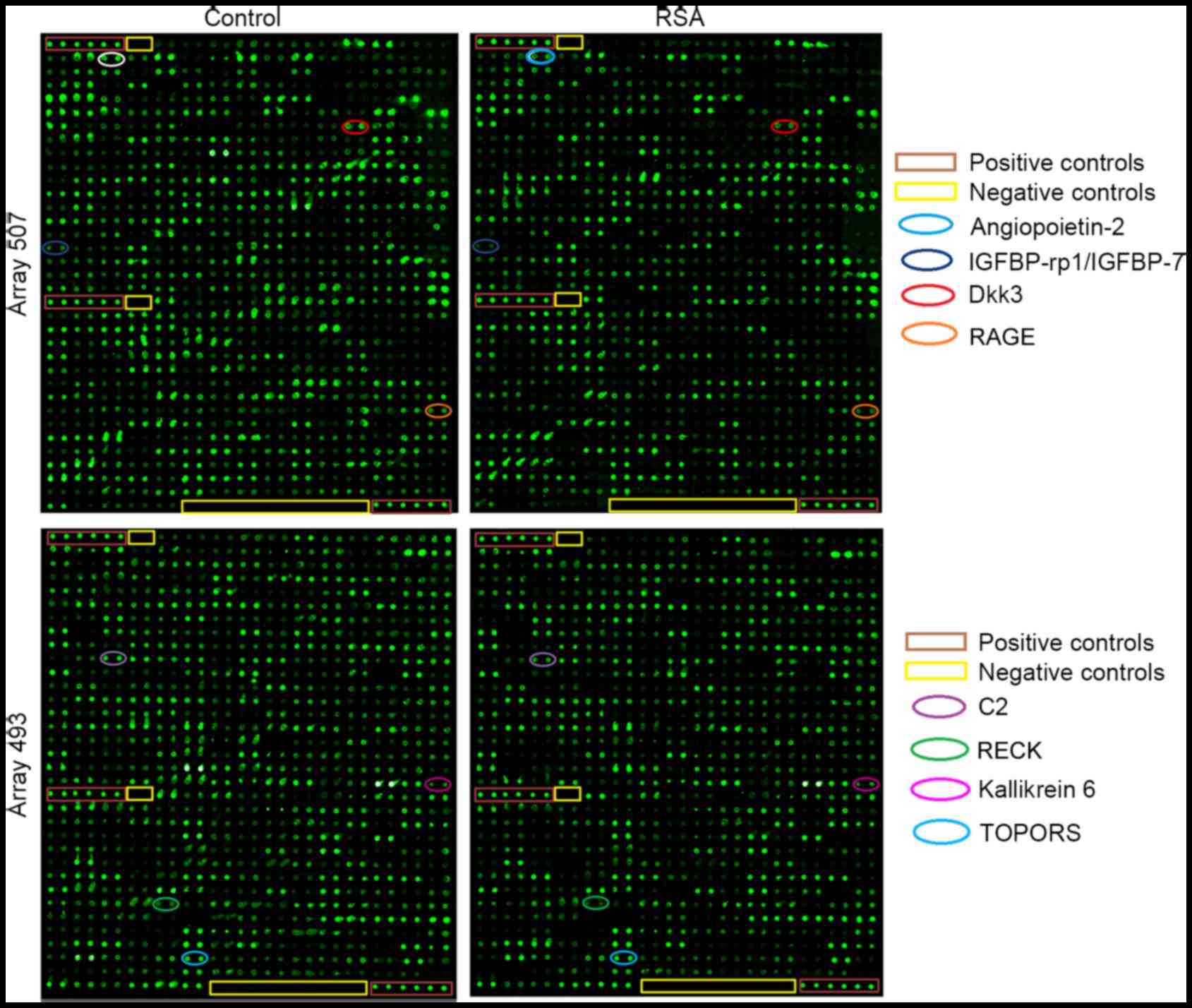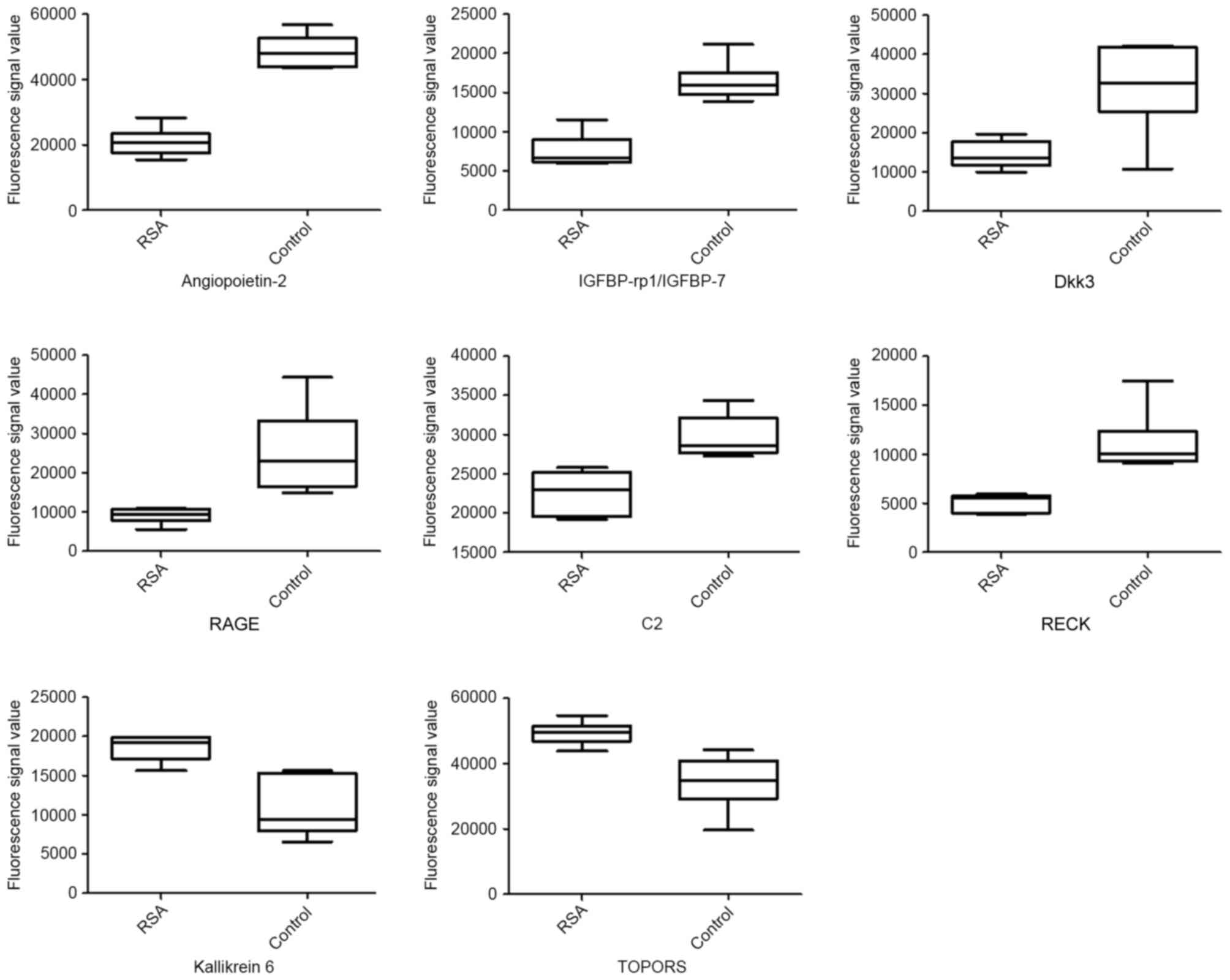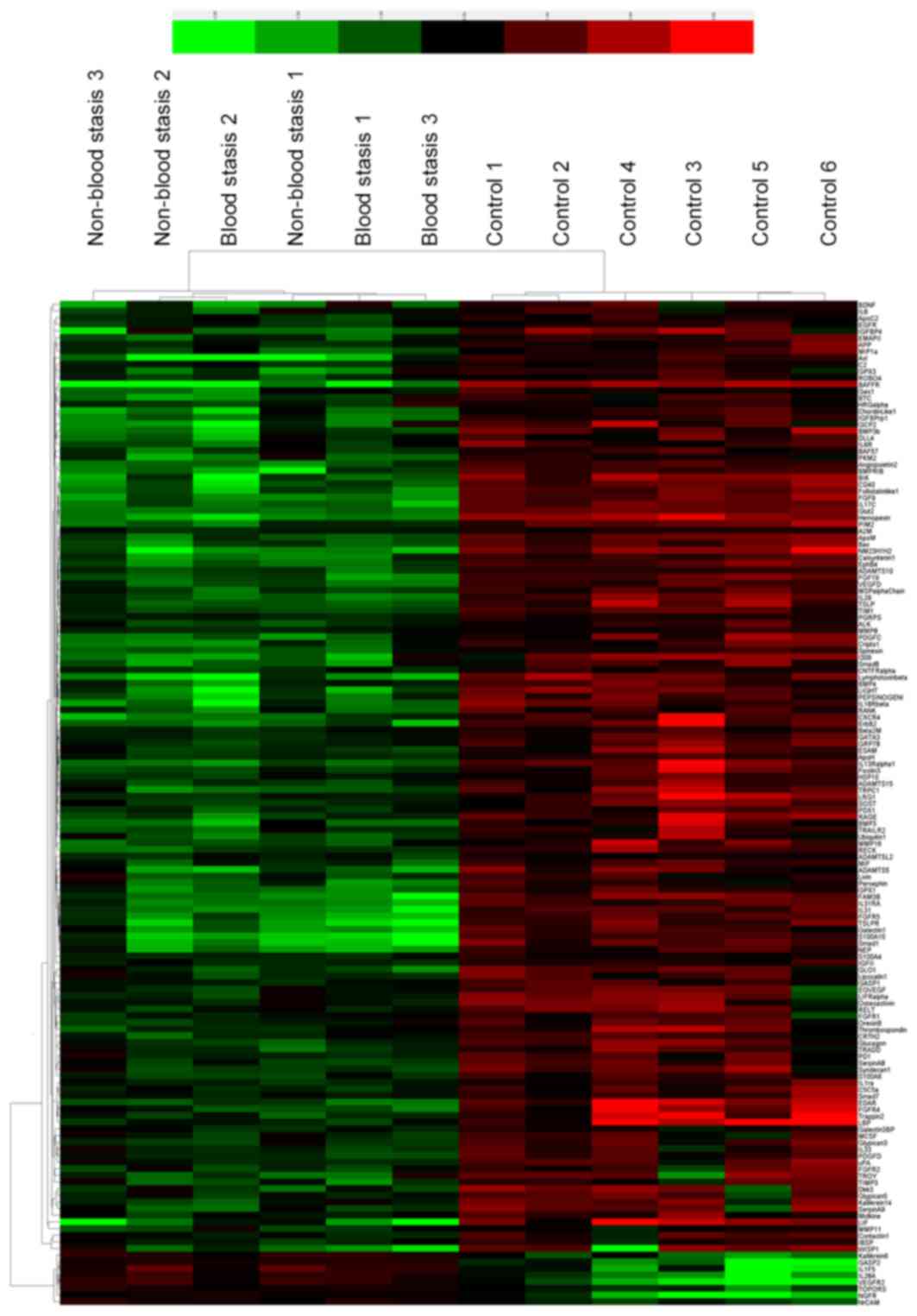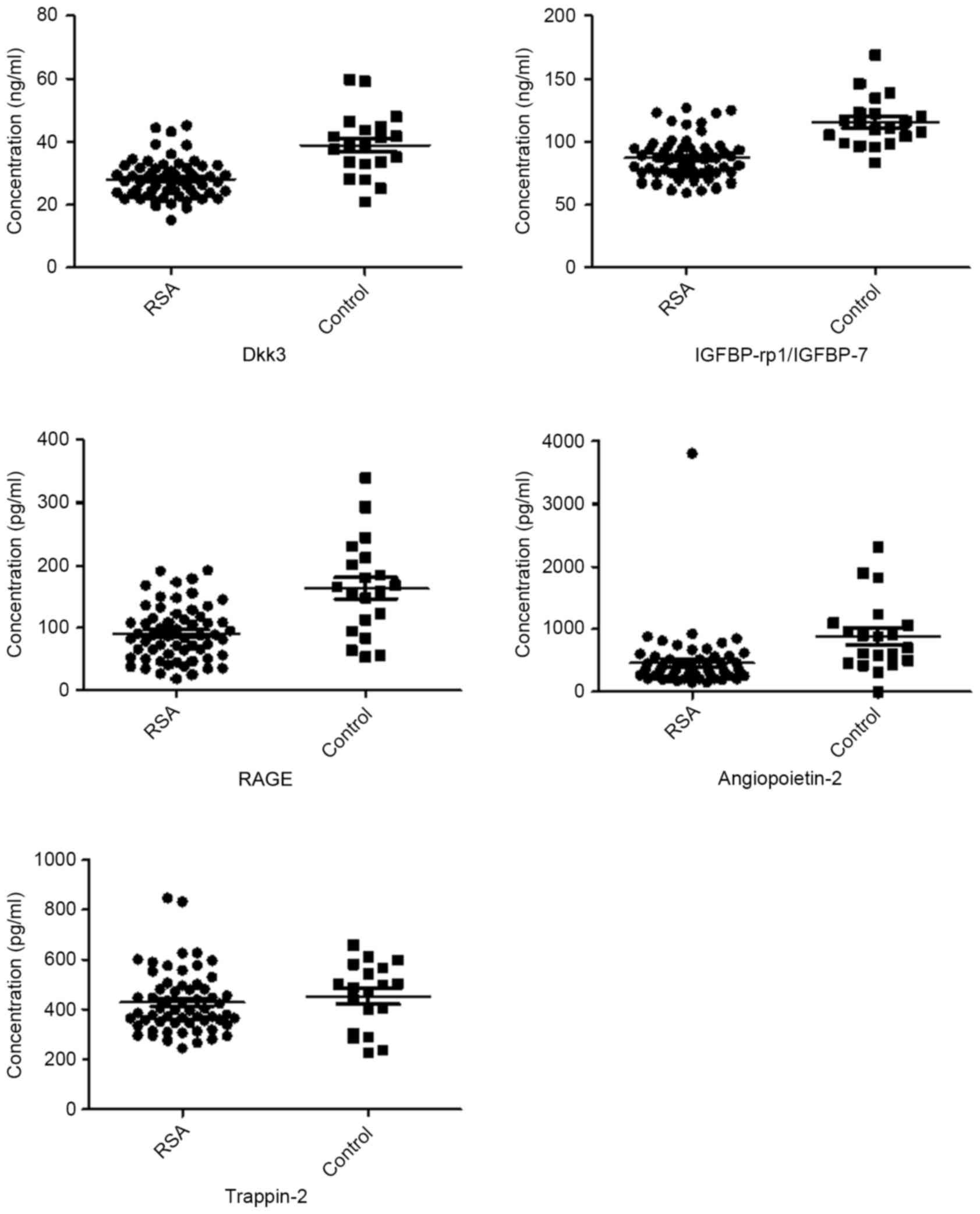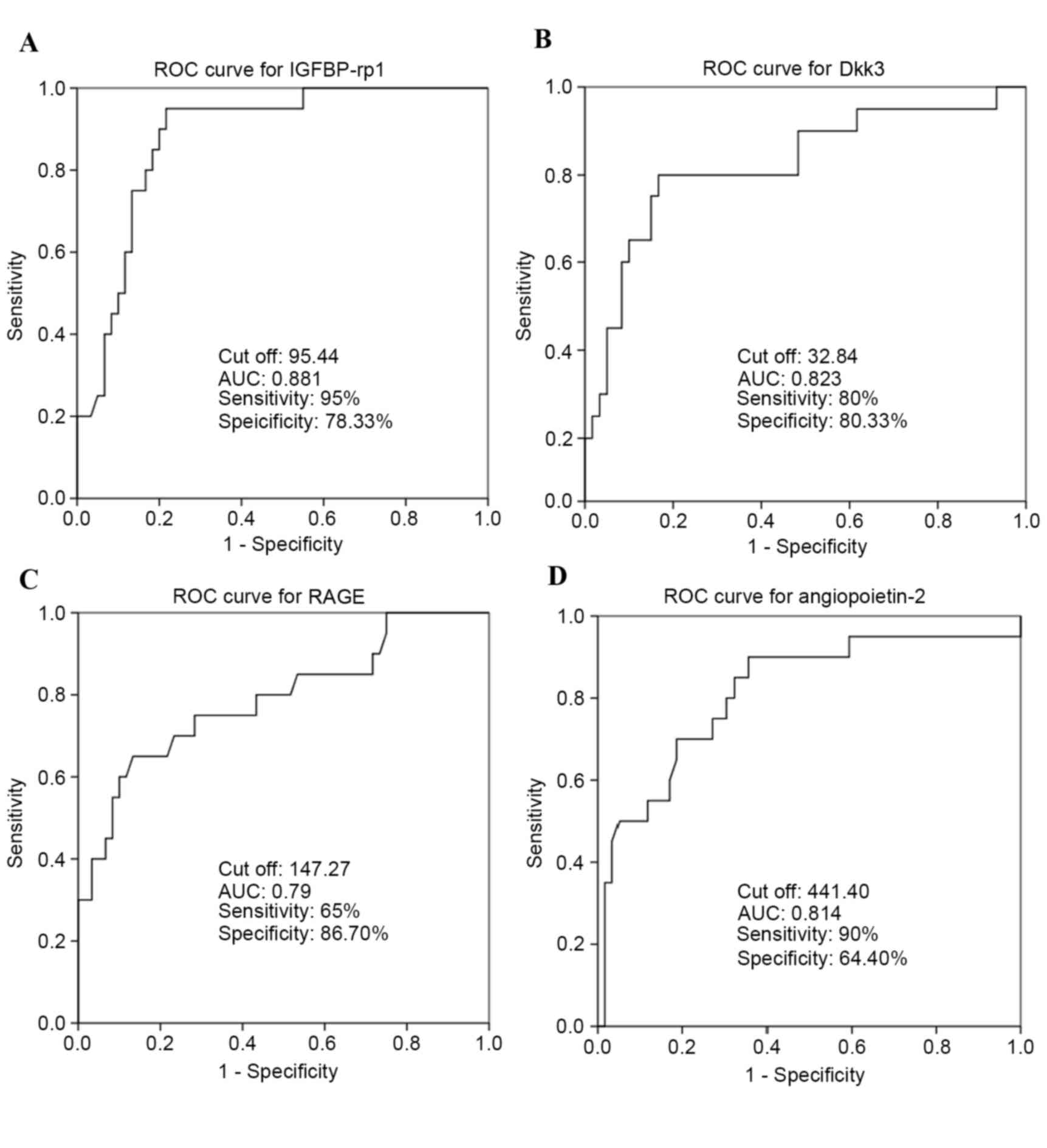|
1
|
Ford HB and Schust DJ: Recurrent pregnancy
loss: Etiology, diagnosis, and therapy. Rev Obstet Gynecol.
2:76–83. 2009.PubMed/NCBI
|
|
2
|
Tang AW, Alfirevic Z, Turner MA, Drury J
and Quenby S: Prednisolone trial: Study protocol for a randomized
controlled trial of prednisolone for women with idiopathic
recurrent miscarriage and raised levels of uterine natural killer
(uNK) cells in the endometrium. Trials. 10:1022009. View Article : Google Scholar : PubMed/NCBI
|
|
3
|
Wen DI and Hong ZB: Research on the
pathogenesis diagnosis and treatment of female reproductive
disorders. J Shanghai Jiaotong Univ. 32:1161–1165. 2012.
|
|
4
|
Li TC, Markris M, Tomsu M, Tuckerman E and
Laird S: Recurrent miscarriage: Aetiology, management and
prognosis. Hum Reprod Update. 8:463–481. 2002. View Article : Google Scholar : PubMed/NCBI
|
|
5
|
Regan L: Recurrent miscarriage. BMJ.
302:543–544. 1991. View Article : Google Scholar : PubMed/NCBI
|
|
6
|
Chuan Z, Jie D, Hao X, Junhua B, Mengjing
G, Liguo P, Yousheng Y, Hong L and Zhenghao H: Associations between
androgen receptor CAG & GGN repeat polymorphism & recurrent
spontaneous abortions in Chinese women. Indian J Med Res.
139:730–736. 2014.PubMed/NCBI
|
|
7
|
Shankarkumar U, Pradhan VD, Patwardhan MM,
Shankarkumar A and Ghosh K: Autoantibody profile and other
immunological parameters in recurrent spontaneous abortion
patients. Niger Med J. 52:163–166. 2011. View Article : Google Scholar : PubMed/NCBI
|
|
8
|
Pang L, Wei Z, Li O, Huang R, Qin J, Chen
H, Fan X and Chen ZJ: An increase in vascular endothelial growth
factor (VEGF) and VEGF soluble receptor-1 (Sflt-1) are associated
with early recurrent spontaneous abortion. PLoS One. 8:e757592013.
View Article : Google Scholar : PubMed/NCBI
|
|
9
|
Rull K, Tomberg K, Kõks S, Männik J, Möls
M, Sirotkina M, Värv S and Laan M: Increased placental expression
and maternal serum levels of apoptosis-inducing TRAIL in recurrent
miscarriage. Placenta. 34:141–148. 2013. View Article : Google Scholar : PubMed/NCBI
|
|
10
|
Burska A, Boissinot M and Ponchel F:
Cytokines as biomarkers in rheumatoid arthritis. Mediators Inflamm.
2014:5454932014. View Article : Google Scholar : PubMed/NCBI
|
|
11
|
Tsangaris GT, Anagnostopoulos AK, Tounta
G, Antsaklis A, Mavrou A and Kolialexi A: Application of proteomics
for the identification of biomarkers in amniotic fluid: Are we
ready to provide a reliable prediction? EPMA J. 2:149–155. 2011.
View Article : Google Scholar : PubMed/NCBI
|
|
12
|
Stortoni P, Cecati M, Giannubilo SR,
Sartini D, Turi A, Emanuelli M and Tranquilli AL: Placental
thrombomodulin expression in recurrent miscarriage. Reprod Biol
Endocrinol. 8:12010. View Article : Google Scholar : PubMed/NCBI
|
|
13
|
Bao SH, Shuai W, Tong J, Wang L, Chen P
and Duan T: Increased Dickkopf-1 expression in patients with
unexplained recurrent spontaneous miscarriage. Clin Exp Immunol.
172:437–443. 2013. View Article : Google Scholar : PubMed/NCBI
|
|
14
|
Huang RP, Burkholder B, Jones Sloane V,
Jiang WD, Mao YQ, Chen QL and Shi Z: Cytokine antibody arrays in
biomarker discovery and validation. Curr Proteomics. 9:55–70. 2012.
View Article : Google Scholar
|
|
15
|
Wilson JJ, Burgess R, Mao YQ, Luo S, Tang
H, Jones VS, Weisheng B, Huang RY, Chen X and Huang RP: Antibody
arrays in biomarker discovery. Adv Clin Chem. 69:255–324. 2015.
View Article : Google Scholar : PubMed/NCBI
|
|
16
|
Burkholder B, Huang RY, Burgess R, Luo S,
Jones VS, Zhang W, Lv ZQ, Gao CY, Wang BL, Zhang YM and Huang RP:
Tumor-induced perturbations of cytokines and immune cell networks.
Biochim Biophys Acta. 1845:182–201. 2014.PubMed/NCBI
|
|
17
|
Liao J, Wang J, Liu Y, Li J, Duan L, Chen
G and Hu J: Modern researches on blood stasis syndrome 1989–2015: A
bibliometric analysis. Medicine (Baltimore). 95:e55332016.
View Article : Google Scholar : PubMed/NCBI
|
|
18
|
Park B, Yun KJ, Jung J, You S, Lee JA,
Choi J, Kang BK, Alraek T, Birch S and Lee MS: Conceptualization
and utilization of blood stasis syndrome among doctors of Korean
medicine: Results of a web-based survey. Am J Transl Res.
6:857–868. 2014.PubMed/NCBI
|
|
19
|
Mahlknecht P, Stemberger S, Sprenger F,
Rainer J, Hametner E, Kirchmair R, Grabmer C, Scherfler C, Wenning
GK, Seppi K, et al: An antibody microarray analysis of serum
cytokines in neurodegenerative Parkinsonian syndromes. Proteome
Sci. 10:712012. View Article : Google Scholar : PubMed/NCBI
|
|
20
|
Khonina NA, Broitman EV, Shevela EY,
Pasman NM and Chernykh ER: Mixed lymphocyte reaction blocking
factors (MLR-Bf) as potential biomarker for indication and efficacy
of paternal lymphocyte immunization in recurrent spontaneous
abortion. Arch Gynecol Obstet. 288:933–937. 2013. View Article : Google Scholar : PubMed/NCBI
|
|
21
|
Metwally M, Preece R, Thomas J, Ledger W
and Li TC: A proteomic analysis of the endometrium in obese and
overweight women with recurrent miscarriage: Preliminary evidence
for an endometrial defect. Reprod Biol Endocrinol. 12:752014.
View Article : Google Scholar : PubMed/NCBI
|
|
22
|
Ibrahim MI, Harb HM, Ellaithy MI,
Elkabarity RH and Abdelgwad MH: First trimester assessment of
Pentraxin-3 levels in women with primary unexplained recurrent
pregnancy loss. Eur J Obstet Gynecol Reprod Biol. 165:37–41. 2012.
View Article : Google Scholar : PubMed/NCBI
|
|
23
|
Kim MS, Gu BH, Song S, Choi BC, Cha DH and
Baek KH: ITI-H4, as a biomarker in the serum of recurrent pregnancy
loss (RPL) patients. Mol Biosyst. 7:1430–1440. 2011. View Article : Google Scholar : PubMed/NCBI
|
|
24
|
Ota K, Yamagishi S, Kim M, Dambaeva S,
Gilman-Sachs A, Beaman K and Kwak-Kim J: Elevation of soluble form
of receptor for advanced glycation end products (sRAGE) in
recurrent pregnancy losses (RPL): Possible participation of RAGE in
RPL. Fertil Steril. 102:782–789. 2014. View Article : Google Scholar : PubMed/NCBI
|
|
25
|
Neuhouser ML, Platz EA, Till C, Tangen CM,
Goodman PJ, Kristal A, Parnes HL, Tao Y, Figg WD, Lucia MS, et al:
Insulin-like growth factors and insulin-like growth factor binding
proteins and prostate cancer risk: Results from the prostate cancer
prevention trial. Cancer Prev Res (Phila). 6:91–99. 2013.
View Article : Google Scholar : PubMed/NCBI
|
|
26
|
Bower NI and Johnston IA: Transcriptional
regulation of the igf signaling pathway by amino acids and
insulin-like growth factors during myogenesis in Atlantic salmon.
PLoS One. 5:e111002010. View Article : Google Scholar : PubMed/NCBI
|
|
27
|
Matsumoto T, Hess S, Kajiyama H, Sakairi
T, Saleem MA, Mathieson PW, Nojima Y and Kopp JB: Proteomic
analysis identifies insulin-like growth factor-binding
protein-related protein-1 as a podocyte product. Am J Physiol Renal
Physiol. 299:F776–F784. 2010. View Article : Google Scholar : PubMed/NCBI
|
|
28
|
Benatar T, Yang W, Amemiya Y, Evdokimova
V, Kahn H, Holloway C and Seth A: IGFBP7 reduces breast tumor
growth by induction of senescence and apoptosis pathways. Breast
Cancer Res Treat. 133:563–573. 2012. View Article : Google Scholar : PubMed/NCBI
|
|
29
|
Liu L, Yang Z, Zhang W, Yan B, Gu Q, Jiao
J and Yue X: Decreased expression of IGFBP7 was a poor prognosis
predictor for gastric cancer patients. Tumour Biol. 35:8875–8881.
2014. View Article : Google Scholar : PubMed/NCBI
|
|
30
|
Kashani K, Al-Khafaji A, Ardiles T,
Artigas A, Bagshaw SM, Bell M, Bihorac A, Birkhahn R, Cely CM,
Chawla LS, et al: Discovery and validation of cell cycle arrest
biomarkers in human acute kidney injury. Crit Care. 17:R252013.
View Article : Google Scholar : PubMed/NCBI
|
|
31
|
Gandhi PU, Gaggin HK, Sheftel AD, Belcher
AM, Weiner RB, Baggish AL, Motiwala SR, Liu PP and Januzzi JL Jr:
Prognostic usefulness of insulin-like growth factor-binding protein
7 in heart failure with reduced ejection fraction: A novel
biomarker of myocardial diastolic function? Am J Cardiol.
114:1543–1549. 2014. View Article : Google Scholar : PubMed/NCBI
|
|
32
|
Kawano Y and Kypta R: Secreted antagonists
of the Wnt signalling pathway. J Cell Sci. 116:2627–2634. 2003.
View Article : Google Scholar : PubMed/NCBI
|
|
33
|
Dellinger TH, Planutis K, Jandial DD,
Eskander RN, Martinez ME, Zi X, Monk BJ and Holcombe RF: Expression
of the Wnt antagonist Dickkopf-3 is associated with prognostic
clinicopathologic characteristics and impairs proliferation and
invasion in endometrial cancer. Gynecol Oncol. 126:259–267. 2012.
View Article : Google Scholar : PubMed/NCBI
|
|
34
|
Niehrs C: Function and biological roles of
the Dickkopf family of Wnt modulators. Oncogene. 25:7469–7481.
2006. View Article : Google Scholar : PubMed/NCBI
|
|
35
|
Park JM, Kim MK, Chi KC, Kim JH, Lee SH
and Lee EJ: Aberrant loss of dickkopf-3 in gastric cancer: Can it
predict lymph node metastasis preoperatively? World J Surg.
39:1018–1025. 2015. View Article : Google Scholar : PubMed/NCBI
|
|
36
|
Guo CC, Zhang XL, Yang B, Geng J, Peng B
and Zheng JH: Decreased expression of Dkk1 and Dkk3 in human clear
cell renal cell carcinoma. Mol Med Rep. 9:2367–2373.
2014.PubMed/NCBI
|
|
37
|
Bao MW, Cai Z, Zhang XJ, Li L, Liu X, Wan
N, Hu G, Wan F, Zhang R, Zhu X, et al: Dickkopf-3 protects against
cardiac dysfunction and ventricular remodelling following
myocardial infarction. Basic Res Cardiol. 110:252015. View Article : Google Scholar : PubMed/NCBI
|
|
38
|
Neeper M, Schmidt AM, Brett J, Yan SD,
Wang F, Pan YC, Elliston K, Stern D and Shaw A: Cloning and
expression of a cell surface receptor for advanced glycosylation
end products of proteins. J Biol Chem. 267:14998–15004.
1992.PubMed/NCBI
|
|
39
|
Yammani RR, Carlson CS, Bresnick AR and
Loeser RF: Increase in production of matrix metalloproteinase 13 by
human articular chondrocytes due to stimulation with S100A4: Role
of the receptor for advanced glycation end products. Arthritis
Rheum. 54:2901–2911. 2006. View Article : Google Scholar : PubMed/NCBI
|
|
40
|
Yang H, Antoine DJ, Andersson U and Tracey
KJ: The many faces of HMGB1: Molecular structure-functional
activity in inflammation, apoptosis, and chemotaxis. J Leukoc Biol.
93:865–873. 2013. View Article : Google Scholar : PubMed/NCBI
|
|
41
|
Yan SD, Chen X, Fu J, Chen M, Zhu H, Roher
A, Slattery T, Zhao L, Nagashima M, Morser J, et al: RAGE and
amyloid-beta peptide neurotoxicity in Alzheimer's disease. Nature.
382:685–691. 1996. View Article : Google Scholar : PubMed/NCBI
|
|
42
|
Dahlmann M, Okhrimenko A, Marcinkowski P,
Osterland M, Herrmann P, Smith J, Heizmann CW, Schlag PM and Stein
U: Rage mediates S100A4-induced cell motility via MAPK/ERK and
hypoxia signaling and is a prognostic biomarker for human
colorectal cancer metastasis. Oncotarget. 5:3220–3233. 2014.
View Article : Google Scholar : PubMed/NCBI
|
|
43
|
Guo Y, Xia P, Zheng JJ, Sun XB, Pan XD,
Zhang X and Wu CZ: Receptors for advanced glycation end products
(rage) is associated with microvessel density and is a prognostic
biomarker for clear cell renal cell carcinoma. Biomed Pharmacother.
73:147–153. 2015. View Article : Google Scholar : PubMed/NCBI
|
|
44
|
Nasser NW, Wani NA, Ahirwar DK, Powell CA,
Ravi J, Elbaz M, Zhao H, Padilla L, Zhang X, Shilo K, et al: Rage
mediates S100A7-induced breast cancer growth and metastasis by
modulating the tumor microenvironment. Cancer Res. 75:974–985.
2015. View Article : Google Scholar : PubMed/NCBI
|
|
45
|
Wang D, Li T, Ye G, Shen Z, Hu Y, Mou T,
Yu J, Li S, Liu H and Li G: Overexpression of the receptor for
advanced glycation endproducts (rage) is associated with poor
prognosis in gastric cancer. PLoS One. 10:e01226972015. View Article : Google Scholar : PubMed/NCBI
|
|
46
|
Hu B and Cheng SY: Angiopoietin-2:
Development of inhibitors for cancer therapy. Curr Oncol Rep.
11:111–116. 2009. View Article : Google Scholar : PubMed/NCBI
|
|
47
|
Bupathi M, Kaseb A and Janku F:
Angiopoietin 2 as a therapeutic target in hepatocellular carcinoma
treatment: Current perspectives. Onco Targets Ther. 7:1927–1932.
2014.PubMed/NCBI
|
|
48
|
Morrissey C, Dowell A, Koreckij TD, Nguyen
H, Lakely B, Fanslow WC, True LD, Corey E and Vessella RL:
Inhibition of angiopoietin-2 in LuCaP 23. 1 prostate cancer tumors
decreases tumor growth and viability. Prostate. 70:1799–1808.
2010.PubMed/NCBI
|
|
49
|
Calfee CS, Gallagher D, Abbott J, Thompson
BT, Matthay MA, et al: NHLBI ARDS Network: Plasma angiopoietin-2 in
clinical acute lung injury: Prognostic and pathogenetic
significance. Crit Care Med. 40:1731–1737. 2012. View Article : Google Scholar : PubMed/NCBI
|
|
50
|
Goede V, Coutelle O, Neuneier J,
Reinacher-Schick A, Schnell R, Koslowsky TC, Weihrauch MR, Cremer
B, Kashkar H, Odenthal M, et al: Identification of serum
angiopoietin-2 as a biomarker for clinical outcome of colorectal
cancer patients treated with bevacizumab-containing therapy. Br J
Cancer. 103:1407–1414. 2010. View Article : Google Scholar : PubMed/NCBI
|
|
51
|
Chang FC, Lai TS, Chiang CK, Chen YM, Wu
MS, Chu TS, Wu KD and Lin SL: Angiopoietin-2 is associated with
albuminuria and microinflammation in chronic kidney disease. PLoS
One. 8:e546682013. View Article : Google Scholar : PubMed/NCBI
|
|
52
|
Conroy AL, Glover SJ, Hawkes M, Erdman LK,
Seydel KB, Taylor TE, Molyneux ME and Kain KC: Angiopoietin-2
levels are associated with retinopathy and predict mortality in
Malawian children with cerebral malaria: A retrospective
case-control study*. Crit Care Med. 40:952–959. 2012. View Article : Google Scholar : PubMed/NCBI
|















